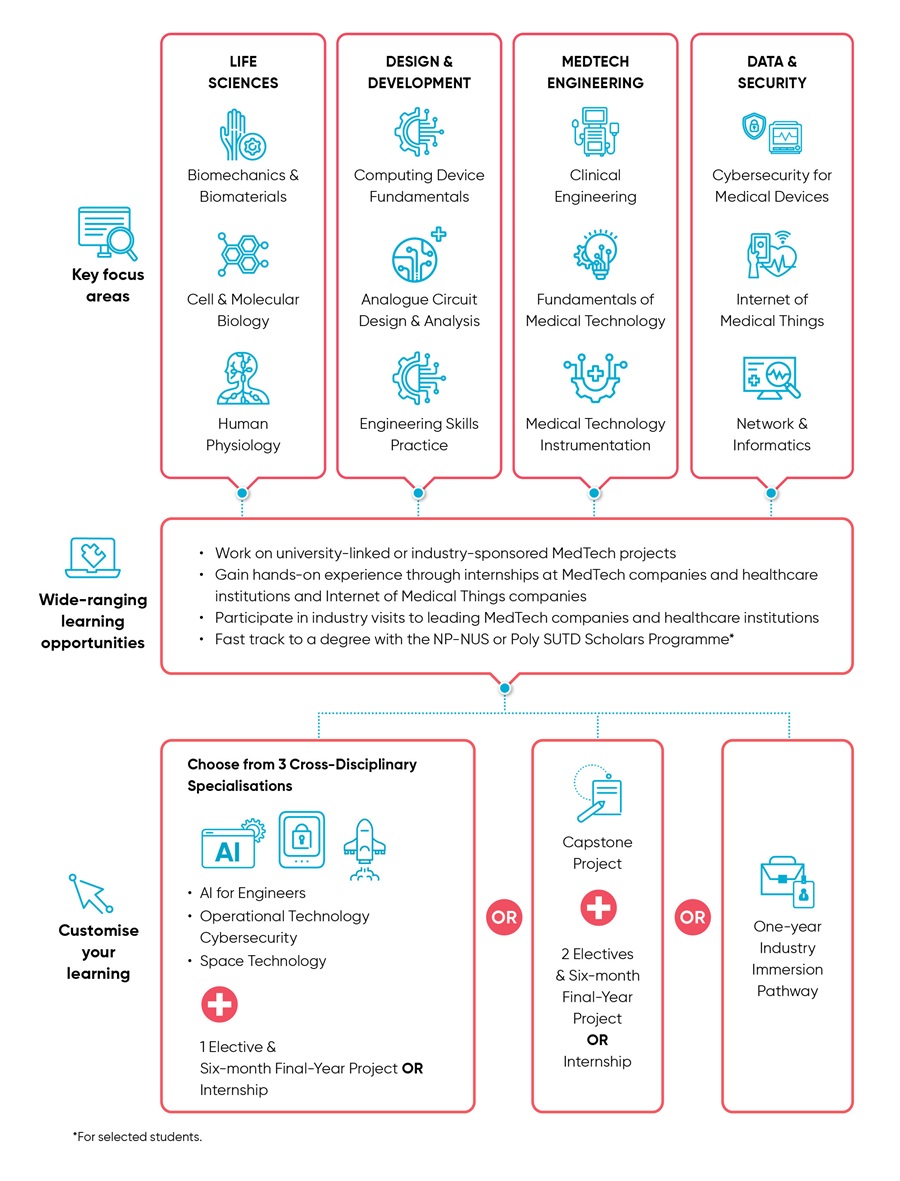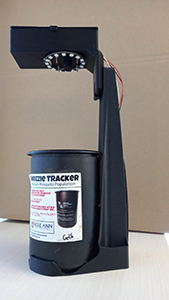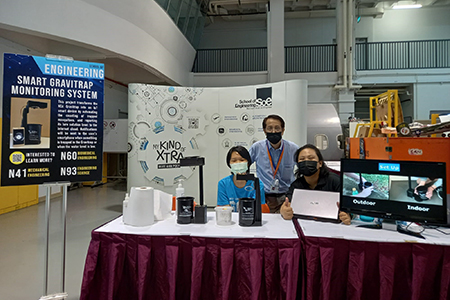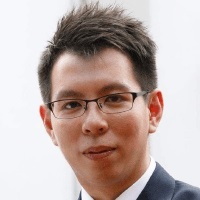Why BME?
- The first poly diploma that integrates engineering with life sciences, with a focus on emerging sectors such as healthcare cybersecurity
- Design and test smart devices for the fast-growing MedTech field, including telehealth solutions, and prosthetic & orthotic devices
- Get future-ready by acquiring transferable skills in niche engineering fields by specialising in AI for Engineers, Operational Technology Cybersecurity or Space Technology New
- Gain real-world industry experience through immersion programmes with leading MedTech companies and healthcare institutions
- Accelerate your learning with the exclusive University Pathway Programmes with NUS or SUTD!
About BME
Fascinated by how engineering and biology can
benefit society? Or are you interested in helping
medical professionals do their work better? If you’re
passionate about the MedTech field, then the Diploma
in Biomedical Engineering (BME) is perfect for you.
This fast-growing field is responsible for the design
of sophisticated medical devices and healthcare
equipment such as personal health trackers —
which range from wearable glucose meters to
electrocardiography (ECG) monitors — and lifesaving
devices including the pacemaker and dialysis machine.
Jointly developed by Ngee Ann Polytechnic’s School
of Engineering and leading industry partners, BME
gives you a firm grounding in research that could lead
to the discovery and development of faster and more
accurate tools for medical treatment.
BME will provide you with a solid grounding in both engineering and the life sciences. You will acquire a strong foundation in areas such as programming, electrical, electronic and mechanical engineering, cell and molecular biology, as well as human physiology.
You will also learn about MedTech engineering, and be equipped with knowledge of relevant quality assurance standards and industry best practices. Our partnerships with industry will ensure that you stay on top of industry developments and the latest strategies, such as Lean Six Sigma, to improve efficiency.
As medical devices become more connected, there is an increased need to ensure these devices are safe from cyber threats. BME will equip you with the skills to embed cybersecurity requirements in the development of MedTech solutions as well as emerging technologies which are increasingly adopted for clinical applications.
To deepen your skills and gain industry experience, you can choose a six-month internship or take on a Final-Year Project sponsored by top multinational companies, leading MedTech organisations, innovative local start-ups, and established healthcare institutions such as Equip Medical, Meiban Medical, and the National University Health System.
Get a head start on your university studies with the University Pathway Programmes at NUS or SUTD! Both pathways let you read university modules and earn credits toward your future degree at either of these prestigious universities while studying at NP.
Overview of Your BME Journey

Highlights
University Pathway Programmes with NUS and SUTD
Mozzie Traps Made Smarter
Further Studies
As a BME graduate, you can pursue various degree programmes at local universities. You can also gain credit exemptions from overseas universities, including the following:
Australia
- University of New South Wales
- Bachelor of Engineering (Honours) / Master of Engineering (Biomedical Engineering)
- Queensland University of Technology
- Bachelor of Engineering (Honours) (Medical)
- University of Queensland
- Bachelor of Engineering (Honours) (Electrical and Biomedical Engineering)
- University of Sydney
- Bachelor of Engineering (Honours) (Biomedical)
United Kingdom
- University of Sheffield
- Bachelor of Engineering (Biomedical Engineering)
- Cardiff University
- Bachelor of Engineering / Master of Engineering (Medical Engineering)
- Bachelor of Engineering / Master of Engineering (Medical Engineering)
Careers
Singapore is fast becoming a global hub for biomedical research and the healthcare industry, and is home to a growing number of multinational MedTech companies and innovative MedTech start-ups. With bright job prospects in this field, you can look forward to pursuing careers in these job roles:
- Assistant Biomedical Engineer
- Assistant Hospital Engineer
- Field Service Engineer
- Quality Assurance Specialist
- Quality Control Laboratory Analyst
- Research Associate
- Sales Engineer
As part of the SkillsFuture initiative, you can enrol in various skills-deepening programmes or apply for the SkillsFuture Work-Study Post-Diploma Programme upon graduation. You may also apply for Workforce Skills Qualifications (WSQ) courses, such as the Specialist Diploma in Workplace Safety & Health.
Entry Requirements
AGGREGATE TYPE ELR2B2-C
To be eligible for consideration, candidates must have the following GCE ‘O’ Level examination (or equivalent) results.
| Subject | 'O' Level Grade |
|---|---|
| English Language | 1-7 |
| Additional Mathematics/Mathematics | 1-6 |
| Any one of the following subjects: Biology Biotechnology Chemistry Computing/Computer Studies Design & Technology Electronics/Fundamentals of Electronics Physics Science (Chemistry , Biology) Science (Physics, Biology) Science (Physics, Chemistry) | 1-6 |
Applicants must also fulfil the aggregate computation requirements for the ELR2B2-C Aggregate Type ( English Language, 2 relevant subjects and 2 other best subjects) listed at www.np.edu.sg/docs/ELR2B2.pdf.
For students with other qualifications, please refer to the NP website for the entry requirements and admissions exercise period.
Candidates with colour vision deficiency, severe vision deficiency, profound hearing deficiency, uncontrolled epilepsy and/or severe physical impairments may encounter difficulties meeting the course requirements and expectations.
What You Will Learn
Mechanical Engineering Fundamentals
This module introduces students to the study of external forces in two dimensions and their effect on particles and rigid bodies that are at rest and at simple linear motion. Students learn the knowledge and skills to analyze the forces acting on the bodies by drawing free-body diagrams and applying the conditions of equilibrium. This module also aims to equip students with the skills to analyze problems of rigid bodies in two dimensions linear motion. Topics include forces and resultants, moments and couples, equilibrium, plane friction, kinematics and kinetics of linear motion.
Electrical Engineering Fundamentals
This module provides a foundation in electricity covering basic concepts of electrical circuits and the methods used to analyse them. The module emphasises the understanding of the basic electrical circuit laws (Ohm’s Law, Kirchhoff’s Voltage and Current Laws) and network theorems, and their application to electrical network analysis. Topics covered include fundamentals of electricity, network theorems, capacitance, electromagnetic induction and inductance, AC waveform and transformer fundamentals.
Engineering Mathematics 1
This module is designed to provide students with the fundamental skills in mathematics required to solve basic engineering problems. Topics are introduced in an order that is intended to keep abreast of the application requirements in engineering modules. The emphasis in each topic is on simple applications and problem solving. Topics include algebra, trigonometry, logarithms, plane analytic geometry, matrices and complex numbers. Throughout the module, there is appropriate use of a Computer Algebra System.
Programming
This practice-oriented module equips students with basic knowledge and skills in computer programming using a suitable high-level language. The main topics include basic computer programming concepts and fundamental programming constructs such as sequences, selection and repetition.
Career & Engineering Professional Preparation
This module aims to give students a head-start in their professional careers as they transit into a polytechnic engineering education. The module will equip students with knowledge and skills that can help them chart, navigate and advance in their individual education and career pathways. Students will be guided in adopting a design thinking approach towards making their education and career plans. They will be exposed to career-centric self-assessment tools and online resources. As part of our efforts to help students benefit from the ubiquity of a professional online presence, students will also establish their online professional brand by showcasing their marketable knowledge, skills and competencies.
To kickstart our students personal and professional development, the module will also impart various knowledge and skills, such as, cultural intelligence, financial literacy, digital literacy, industry networking and safety. The topic on safety will be taught according to the Competency Unit “Develop a Risk Management Implementation Plan” from the Singapore Workforce Skills Qualifications (WSQ) National Competency Standard. To augment this qualification, students will participate in industry engagements and service projects to glean the importance of safety in the engineering profession and societal context.
Innovation Made Possible^
This module aims to help students discover and hone their innate ability to think creatively and come up with innovations to tackle problems close to their hearts. Underpinned by the Design Thinking framework, students will be sensitised to the process of user-centric problem solving. They will be introduced to concepts such as empathy, problem-definition, ideation, prototyping and testing through a practical approach featuring engaging out-of-classroom activities, just-in-time master-classes and a hands-on, “learning by doing” delivery format. Ultimately, the module will help students recognise that innovation is attainable and fun and develop creative confidence to explore new ideas in their studies and beyond.
English Language Express^*
^* For selected students only
^Critical Core modules account for 13 credit units of the diploma
curriculum. They include modules in communication, innovation and
world issues, as well as an interdisciplinary project. By bringing
students from diverse diplomas together, the interdisciplinary
project fosters collaboration to explore and propose solutions for
real-world problems. NP aims to develop students to be agile and
self-directed learners, ready for the future workplace.
The module introduces the basic concepts of digital electronics and their applications in embedded systems. Students will learn the use of C programming language in an embedded system environment and this is supplemented by a microcontroller kitset. Students are expected to work in groups and undertake project work involving the use of a microcontroller and discrete components.
Fundamentals of Medical Technology
The module lays the foundation in analogue electronics and their applications in medical equipment and instrumentation. The coverage of this module includes the operating characteristics, working principles and applications of discrete components such as operational amplifiers configured as various amplifiers and filters for specific purposes. The module will also focus on circuitry building and troubleshooting to enhance and strengthen the student’s skills and knowledge in the applications of discrete components in medical equipment.
Human Physiology
The module provides the fundamental understanding of the anatomy and physiology of the human body, which is an essential foundation for the students to bridge science and engineering. The module will cover the various organ systems in a human body such as the cardiovascular and respiratory system.
Confident Communication: Find Your Voice (VOICE)^
This module is designed to empower students to become thoughtful and confident communicators, while discovering their personal voice in self-expression. It equips students with the skills to communicate with impact in a variety of settings, by tailoring their message to suit audience, purpose and context. Students will learn how to utilise storytelling structures and techniques, persuasive strategies and effective visuals to connect meaningfully with their audience. The module also features a personalised growth plan that enables students to customise their learning experience according to their individual needs and aspirations. Peer learning and coaching circles provide students the platform to practise their critical reasoning and presentation skills in a safe environment. Ultimately, the module encourages students to reflect on their communication habits and develop practical strategies to enhance their effectiveness as communicators.
Engineering Mathematics 2
This module is designed to provide students with the fundamental skills in mathematics required to solve basic engineering problems. Topics are introduced in an order that is intended to keep abreast of the application requirements in engineering modules. The emphasis in each topic is on simple applications and problem solving. Throughout the module, there is appropriate use of a Computer Algebra System. Topics include trigonometry, differentiation and simple integration with applications.
Health & Wellness^
This module provides you with an opportunity to be active, keep fit and stay healthy through basic sports skill acquisition. It also aims to enhance your social and psychological well-being through a variety of sports electives while taking you through the process of character development, choice and decision making.
^Critical Core modules account for 13 credit units of the diploma curriculum. They include modules in communication, innovation and world issues, as well as an interdisciplinary project. By bringing students from diverse diplomas together, the interdisciplinary project fosters collaboration to explore and propose solutions for real-world problems. NP aims to develop students to be agile and self-directed learners, ready for the future workplace.
Analogue Circuit Design & Analysis
This is a hands-on module that equips students with the necessary practical skills in electronic circuit breadboarding, prototyping, identifying components, use of equipment for measurement, soldering and project board construction. Basic troubleshooting techniques and computer aided design (CAD) tools will also be introduced to aid in the design of a printed circuit board (PCB). Students will learn the application of these skillsets in the design of medical devices.
Cell and Molecular Biology
The module introduces the cell and molecular biology concepts. It equips students with an understanding of eukaryotic cell biology, including fundamental chemicals necessary for life, structure and function of cells and organelles, cellular transport mechanisms, cell divisions, deoxyribonucleic acid replication, protein synthesis, genetics, principles of inheritance, cell-to-cell interactions and cell development.
Clinical Engineering
This module is intended to provide learners with an understanding of the roles, functions and regulatory requirements of a biomedical engineering department in a hospital environment. Students will perform calibration, specify the appropriate electrical safety tests to be conducted and verify functional performance of medical equipment. They are also expected to apply their engineering skills to test functions of medical equipment.
Cybersecurity Essentials
The module is designed for learners who are interested in pursuing more advanced studies the field of cybersecurity. The preparatory materials provide with an overview of the cybersecurity field where it explores the characteristics of and tactics used by cyber criminals. It then delves into the technologies, products and procedures cybersecurity professional use to combat cybercrime which it will help to explore ways to be safe online, learn the different types of malware and attacks, measures used by organisations to mitigate the attacks or threats.
Engineering & Sustainability
This module aims to develop in our students the knowledge, skills and disposition towards sustainability by introducing them to the dominant environmental and climate change issues caused by technological developments. Students will learn about sustainability design in the context of engineering design considerations, such as, resource efficiency, environmentally friendly materials, innovative sustainable products, lean and green operations, remanufacturing and responsible sourcing. In collaboration with community and industry partners, Service-Learning projects provide opportunities for the students to apply and hone their green skills while developing a deeper understanding of environmental sustainability issues and their social impacts both locally and globally. The module also encourages students to appreciate and explore green job opportunities in engineering. Career and Professional Preparation 2 is incorporated to equip students with the skills necessary to seek and secure such work opportunities. They will also be equipped to communicate their personal brand more effectively. As students sharpen their communication skills, they will also learn how to market themselves effectively.
The module will introduce to students the prototyping techniques on the assembly and practical skills to implement electronic circuitry in a medical device. Students will learn the process for planning, construction and testing of a product development. The module provides hands-on practice for breadboarding, circuit assembly, test & measurement, fault finding, and application of the circuitry in an embedded system environment.
Biomechanics & Biomaterials
The module equips students to apply mechanical engineering principles to perform simple force analysis of the musculoskeletal system. It also provides an appreciation of the kinematics and kinetics of human motion. Rehabilitation engineering, including causation, orthopaedic and prosthetic interventions will be discussed. Students will also be introduced to the concepts of biological materials, biomaterials, implants and tissue engineering.
Medical Technology Instrumentation
This module introduces students to a curated range of medical technology instrumentation and/or equipment. It prepares students to understand, setup, fault finding and perform functional testing on these devices. Students will also be exposed to basic manufacturing instruments used in the medical technology industry through simulation platform.
Network & Informatics
The module introduces the know-how to integrate a network with different medical equipment and devices to store, retrieve and analyse healthcare data in a healthcare establishment. It covers networking concept and data analytic processing concept. Students will acquire the necessary skills and knowledge to perform basic network configuration, network connectivity testing and applying basic machine learning in biomedical data analytic.
World Issues: A Singapore Perspective^
This module takes a global approach to significant current and historical events. The aim is to enhance students' understanding of such events and issues in the context of Singapore, as well as challenge students to think critically about choices and decision- making vis-à-vis the nation state.
^Critical Core modules account for 13 credit units of the diploma curriculum. They include modules in communication, innovation and world issues, as well as an interdisciplinary project. By bringing students from diverse diplomas together, the interdisciplinary project fosters collaboration to explore and propose solutions for real-world problems. NP aims to develop students to be agile and self-directed learners, ready for the future workplace.
Project ID: Connecting the Dot^
This module aims to prepare students for an increasingly globalized and interconnected world where problems are multi-faceted and require interdisciplinary research and collaboration to solve. Using a project-based learning approach, students will have the opportunity to work in a multi-disciplinary team to investigate and propose comprehensive recommendations for a pressing real-world problem affecting Singapore. They will be guided to step out of their disciplinary silos and effectively communicate and collaborate with peers from different backgrounds. Ultimately, the module seeks to develop independent learning skills and the ability to synthesize diverse strands of knowledge to solve a complex problem, while impressing on students the importance of being a responsible global citizen.
Year-Long Internship I
The year-long internship aims to enhance existing internships to enable a more structured applied learning pathway co-supervised by company supervisor and polytechnic lecturer. Learning resources would be purposefully designed to scaffold students’ learning throughout the year-long internship phase. The learning resources would cover the essential knowledge and comprise an inventory of essential on-the-job tasks designed to cover the desired applied learning outcomes as part of the year-long internship assessment. The contents of the learning resources will be jointly developed with the industry. Students are expected to submit a final report at the end of each semester and present what they have learned. Assessment would be conducted jointly by the company supervisors and the school.
Final Year Project I
This year-long project module is designed to provide students with practical, hands-on experience while developing skills and knowledge comparable to those gained through traditional structured modules. The module focuses on a comprehensive, real-world engineering problem or innovation challenge, which students will work on from inception to completion in that semester. Throughout the project, students will engage in research, design, analysis, prototyping, testing, and reporting, mimicking the processes found in engineering disciplines. They will be required to apply theoretical knowledge from core subjects, solve complex problems. The project will encourage collaboration, critical thinking, and innovative problem-solving, simulating industry practices and preparing students for professional engineering roles.
ELECTIVES
Process & Optimisation
The elective module introduces the general medical technology manufacturing process, the related quality systems and performance indicators. Students will also learn techniques and/or tools for process improvement by identifying and removing the causes of defects/faults and minimising the variability in either manufacturing or business processes.
Medical Data Analytics
The elective module deepens learners’ prior learning in the principles and applications of data analytics in the medical technology and healthcare field. Learners will be equipped with how to extract, clean, analyse and interpret medical data to improve patient outcomes, optimise healthcare operations or support evidence-based decision-making. Learners will also acquire an understanding the different types of medical data, how to create effective visuals to communicate and ethical issues related to medical data.
Internet of Medical Things
The elective module equips learners with a fundamental exposure to an embedded Internet of Things (IoT) system. They will learn the system architecture of a typical embedded IoT system with a good understanding of functionalities of its building blocks through practical exercises and its application in the medical technology or healthcare industry. Learners are expected to implement a simple embedded IoT system prototype with off-the-shelf equipment, platforms or services.
Capstone Project
– Choose 2 Elective Modules
AI for Engineers Specialisation Modules
Fundamentals of Machine Learning
This module introduces students to the fundamentals of machine learning principles and practices. It covers a range of machine learning models and algorithmic machine learning methods in supervised and unsupervised learning.
Fundamentals of Neural Networks and Deep Learning
This module introduces students to the fundamental principles of neural networks and deep learning. It covers the concepts and architecture of feedforward neural networks, convolutional neural networks, and other deep learning structures. Students will develop deep learning-based solutions to practical problems such as those in the areas of computer vision, forecasting.
Integrated Projects in Machine Learning
This module aims to integrate the knowledge learnt in the semester and apply it in practical applications. Students will work in teams and undertake the projects/case studies to develop deeper skills in data engineering, and building up end-to-end machine learning solutions.
Operational Technology Cybersecurity Specialisation Modules
Industrial Automation
This module aims to equip students with the basic knowledge of automation technologies and their applications in the manufacturing and process industries. With the rise of new digital industrial technology, known as Industry 4.0, students will also be introduced to smart sensors and actuators using IO-Link technology. This technology enables communication within the system (host controller) down to the sensor level.
Major topics include electro-pneumatics technology, programmable logic control and IO-Link technology. The essential hardware components used in automated systems, such as sensors, valves and actuators will be applied to the automated systems. Widely accepted industrial control programming language ladder and inline structured text will be covered, in conjunction with the learning of programming logic controllers and computer interfaces.
Laboratory work involves hands-on circuit construction and implementation using these various technologies and techniques, which enhances students’ understanding of the practical aspects of circuit designs.
Operational Technology Security
With Industry 4.0, the modern Industrial Control System (ICS) are facing more advanced threats from the Internet outside as a result of the Informational Technology/ Operational Technology (IT/OT) convergence. Protecting them through Operational Technology (OT) cyber defense is an evolving field required to continually adapt cybersecurity strategies so as to maintain the safety and reliability of production operation.
This module aims to equip students with the knowledge of design, maintenance and protection functions within the Operational Technology (OT) environment. Using a case study of a simulated environment with Industrial Internet of Things Capability (IIoT) capability, the student perform activities with relevance to OT cybersecurity administration and maintenance in order to establish a secure OT environment. This includes performing asset discovery, managing vulnerabilities in existing OT systems, as well as performing access control management across OT systems and devices
In addition, the module also introduces the concept of industrial networking and various cyber security standards, protocols and frameworks and are knowledgeable in using various cybersecurity tools to perform their job accordingly.
Cyber Governance, Risk & Compliance
This module examines the relevant frameworks to ensure that information assets are protected within an organization. It includes the processes and policies for administering and managing a company’s IT systems that follow the compliance framework. Concepts on risk management process, risk analysis and mitigation will also be introduced. Students will learn to evaluate risks against the company’s critical assets and deploy safeguards to mitigate them. Control frameworks such as PCI (Payment Card Industry), ISO 17799/27002, and COBIT will be covered.
Space Technology Specialisation Modules
Satellite Systems Design and Engineering
This module provides a specialised study of satellite engineering and space systems design. Students will gain a deep understanding of orbital mechanics, the space environment, and the subsystems essential to satellite operation, including power, thermal control, communications, and attitude determination and control. Beyond spacecraft design, the module examines the environments in which satellites are built and launched, addressing ground infrastructure, cleanroom and testing facilities, launch vehicles, and the regulatory frameworks that govern access to space. Emphasis is placed on applying systems engineering methods to mission analysis and design, preparing students for advanced research or professional practice in the global space industry.
Capstone Project: CanSatellite
This capstone module provides students with a unique opportunity to engage in the end-to-end development of a CanSatellite, a miniature satellite housed within the volume and shape of a soda can. Designed to closely mimic the development, integration, testing, and validation phases of an actual satellite bus system, the project simulates industry-standard practices.
Working in multidisciplinary teams, students will design, fabricate, test, and qualify a fully functional CanSatellite that meets specified mission requirements. The experience includes iterative reviews and real-world constraints, culminating in a flight test and post-mission analysis. Emphasis is placed on systems engineering, cross-functional collaboration, and engineering documentation.
^Critical Core modules account for 13 credit units of the diploma
curriculum. They include modules in communication, innovation and
world issues, as well as an interdisciplinary project. By bringing
students from diverse diplomas together, the interdisciplinary
project fosters collaboration to explore and propose solutions for
real-world problems. NP aims to develop students to be agile and
self-directed learners, ready for the future workplace.
Final Year Project
In this module, learners will work in groups to design and develop a product or system related to a real-world project with prescribed and specific deliverables. Learners are expected to apply their knowledge and skills in creative problem solving, engineering and design, teamwork and project management. Learners will fabricate a prototype, assemble the parts, test and refine the prototype and/or software developed. Proper documentation, project report and presentation will form part of the learner’s assessment.
Six-month Internship (Local/Overseas)
The six-month internship aims to provide practice-oriented training to equip students with the appropriate knowledge, management and communication skills imbued with the right values to work in the medical technology and/or healthcare industry. Students will get the chance to understand the organisational structure, company product and go through the workflow and/or project with company employees. Both industry supervisors and NP supervisors will assess students’ performance.
Year-Long Internship II
The year-long internship aims to enhance existing internships to enable a more structured applied learning pathway co-supervised by company supervisor and polytechnic lecturer. Learning resources would be purposefully designed to scaffold students’ learning throughout the year-long internship phase. The learning resources would cover the essential knowledge and comprise an inventory of essential on-the-job tasks designed to cover the desired applied learning outcomes as part of the year-long internship assessment. The contents of the learning resources will be jointly developed with the industry. Students are expected to submit a final report at the end of each semester and present what they have learned. Assessment would be conducted jointly by the company supervisors and the school.
Final Year Project II
This year-long project module is designed to provide students with practical, hands-on experience while developing skills and knowledge comparable to those gained through traditional structured modules. The module focuses on a comprehensive, real-world engineering problem or innovation challenge, which students will work on from inception to completion in that semester. Throughout the project, students will engage in research, design, analysis, prototyping, testing, and reporting, mimicking the processes found in engineering disciplines. They will be required to apply theoretical knowledge from core subjects, solve complex problems. The project will encourage collaboration, critical thinking, and innovative problem-solving, simulating industry practices and preparing students for professional engineering roles.
One-year Internship (Local/Overseas) OR One-year Project






